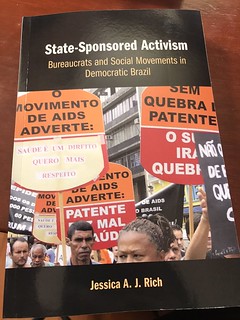 Dr. Jessica A. J. Rich is an incredible researcher, scholar, and writer. Her book, “State-Sponsored Activism: Bureaucrats and Social Movements in Brazil” is a textbook model for how to write a book in so many ways. I also study social movements in Latin America, so it was important for me to read her book and catch up with the most recent and cutting edge scholarship.
Dr. Jessica A. J. Rich is an incredible researcher, scholar, and writer. Her book, “State-Sponsored Activism: Bureaucrats and Social Movements in Brazil” is a textbook model for how to write a book in so many ways. I also study social movements in Latin America, so it was important for me to read her book and catch up with the most recent and cutting edge scholarship.
Furthermore, as someone who teaches both research design, research methods and academic writing, I wanted to read it to help my students learn how to write better, particularly those who have decided to write a book-manuscript-style doctoral dissertation. I can certify that her book’s introductory chapter is pure gold.
You can read the entire book yourselves, as it is a real delight, and extremely insightful. Most importantly, for those of us teaching Research Design, “State-Sponsored Activism” offers a great model that you can show your doctoral students for how to construct their PhD dissertation’s argument and structure.
Two core questions animate Dr. Rich’s book: “how does civil society develop the capacity to organize and advocate for collective political goals? And what explains the endurance of civic activism once the initial success of setting policy has passed?” (p. 4, Rich 2022)
Rich’s book argument can be summarized as follows: “Brazil AIDS movement was able to endure and even expand over time because the movement was cultivated by national government bureaucrats who depended on activists to help them pursue their policy goals” (p. 4). This finding resonates with results from my own research.
In my work I found that SEMARNAT officials actively aided and supported RETC activists as they wanted to harmonize environmental policy instrument design for PRTRs across all of North America, even though the Mexican was targeted for policy change (Pacheco-Vega 2005). Insights I gained from this research tracks with what Rich finds in her own work. Bureaucrats can, and often will, use their relationships with civil society organizations to advance their own policy goals, through them. In a way, they operate in a similar way to what I call a second-order pressure transmission mechanism (Pacheco-Vega 2015).
 Though I loved the entire book, two sections in the introductory chapter really stood out for me: Alternative Explanations (where Dr. Rich clearly lays out different potential AEs to her research questions) and the Contributions section (expanded in Chapter 8).
Though I loved the entire book, two sections in the introductory chapter really stood out for me: Alternative Explanations (where Dr. Rich clearly lays out different potential AEs to her research questions) and the Contributions section (expanded in Chapter 8).
When I teach Research Design, I actively emphasize to my students the importance of making their research contributions VERY CLEAR. Rich makes her contributions stand out by contrasting her findings with traditional theories of civil society. This theory-empirics link is KEY.
Overall, a fantastic book that I enjoyed and plan to assign in my Research Design class and thesis completion workshop.
10/10 recommended reading.

0 Responses
Stay in touch with the conversation, subscribe to the RSS feed for comments on this post.